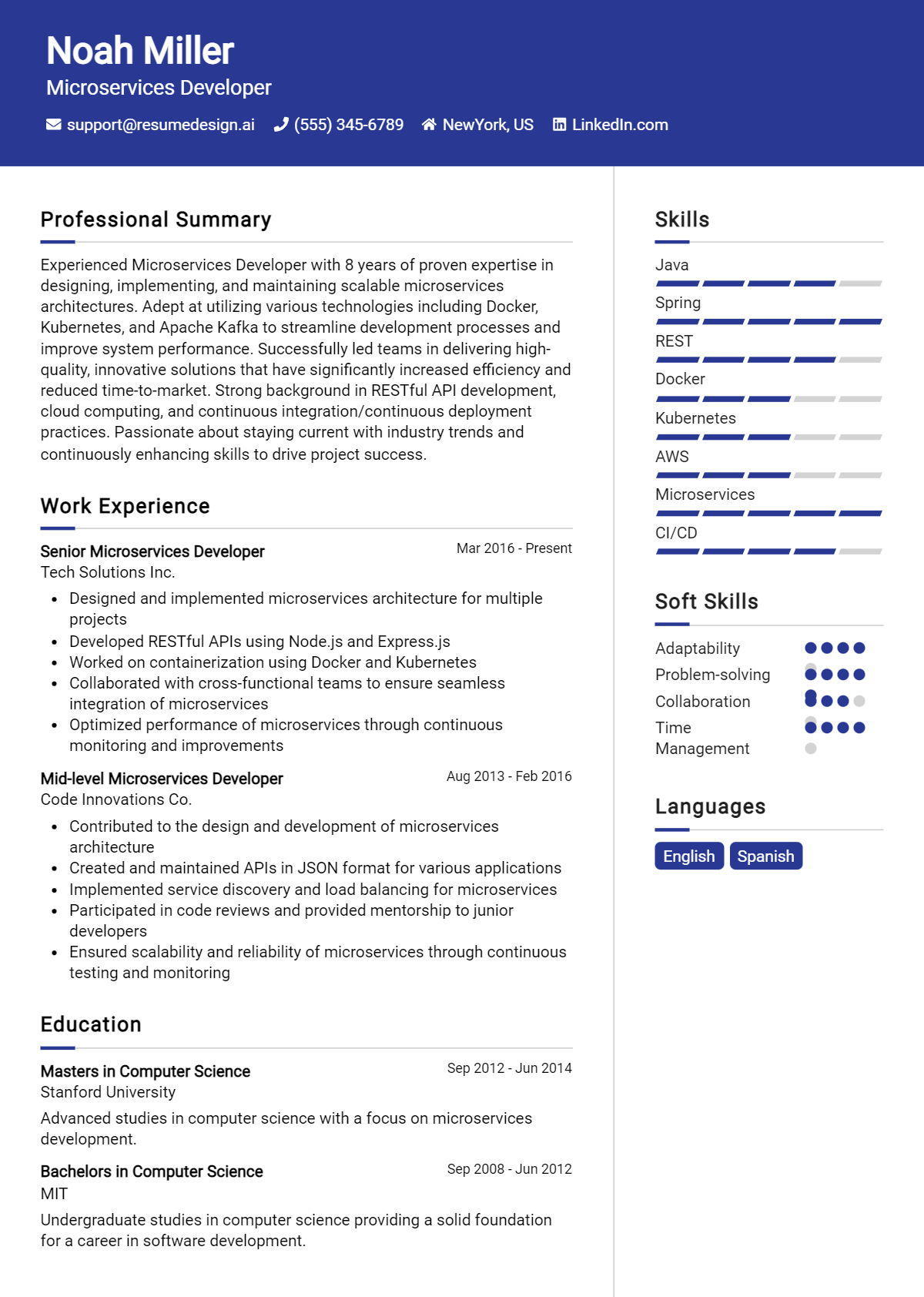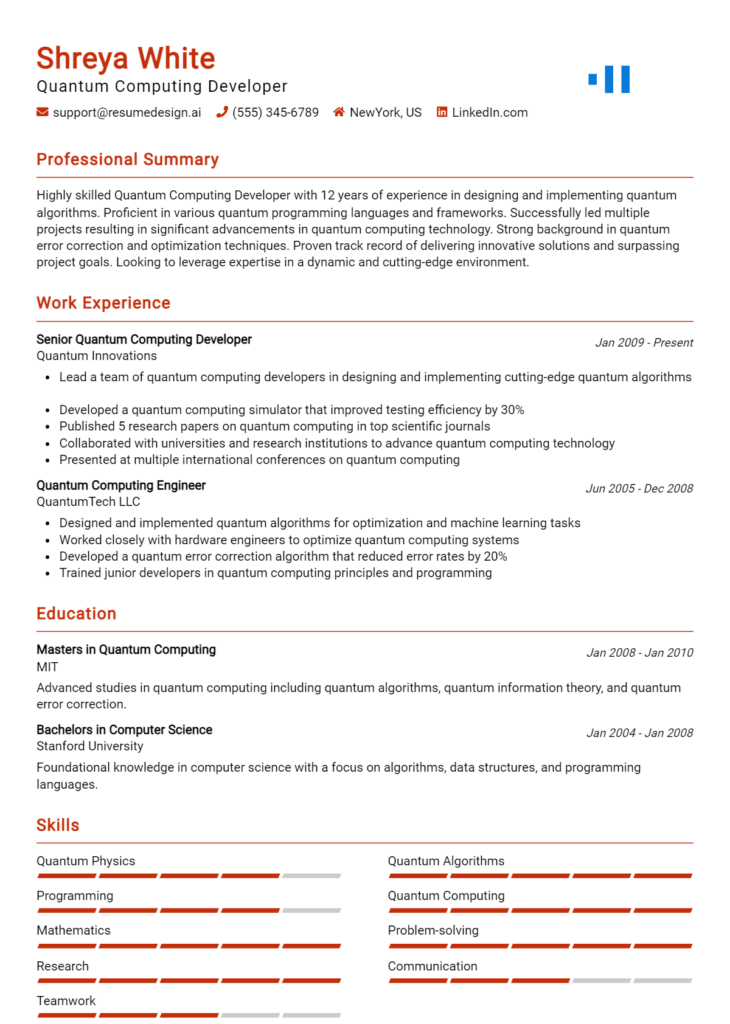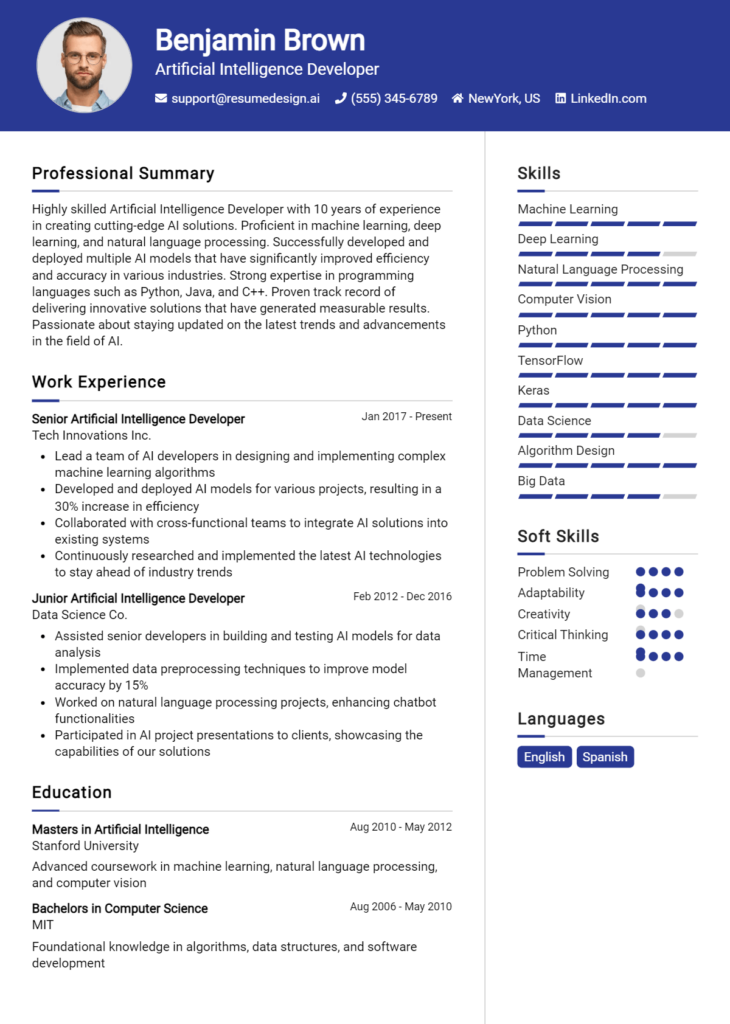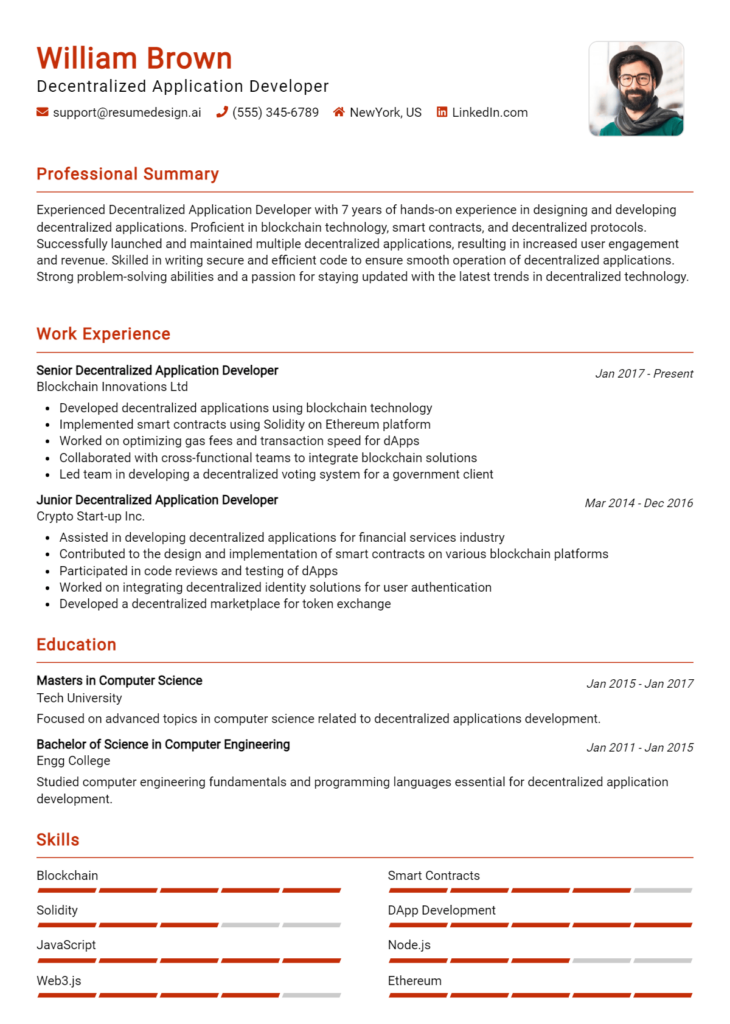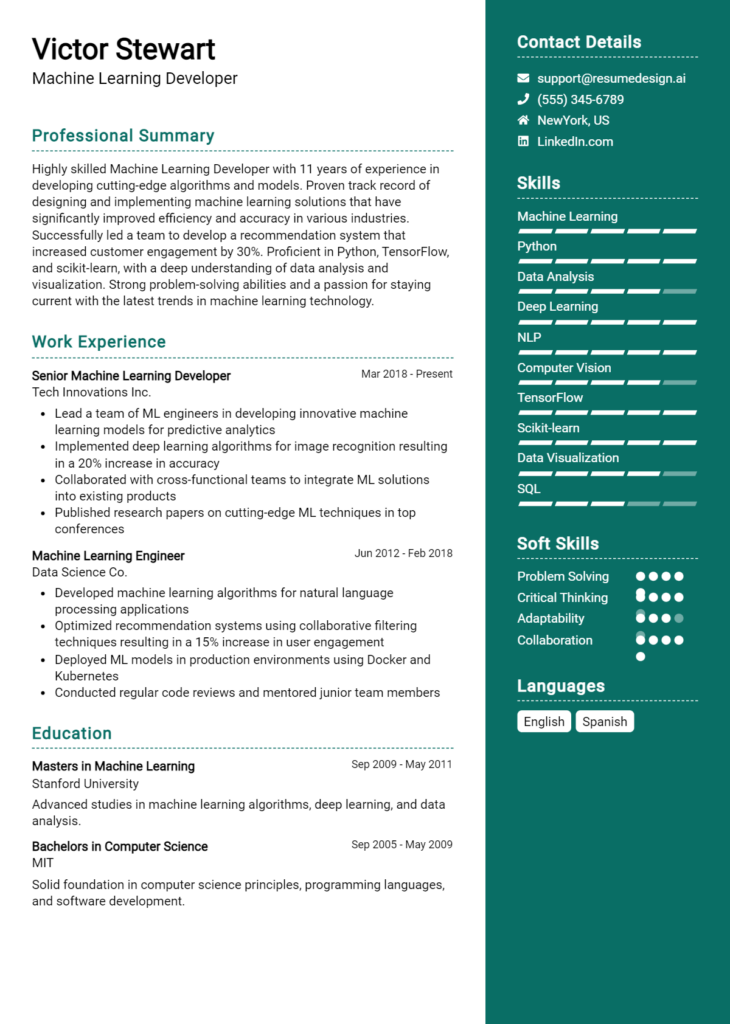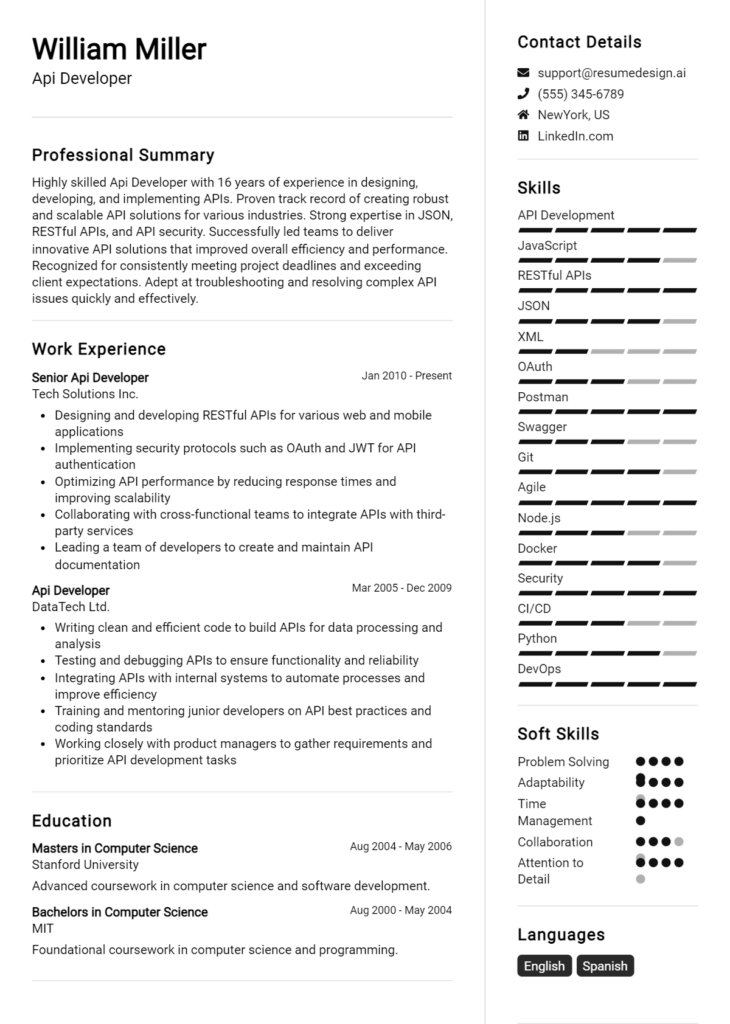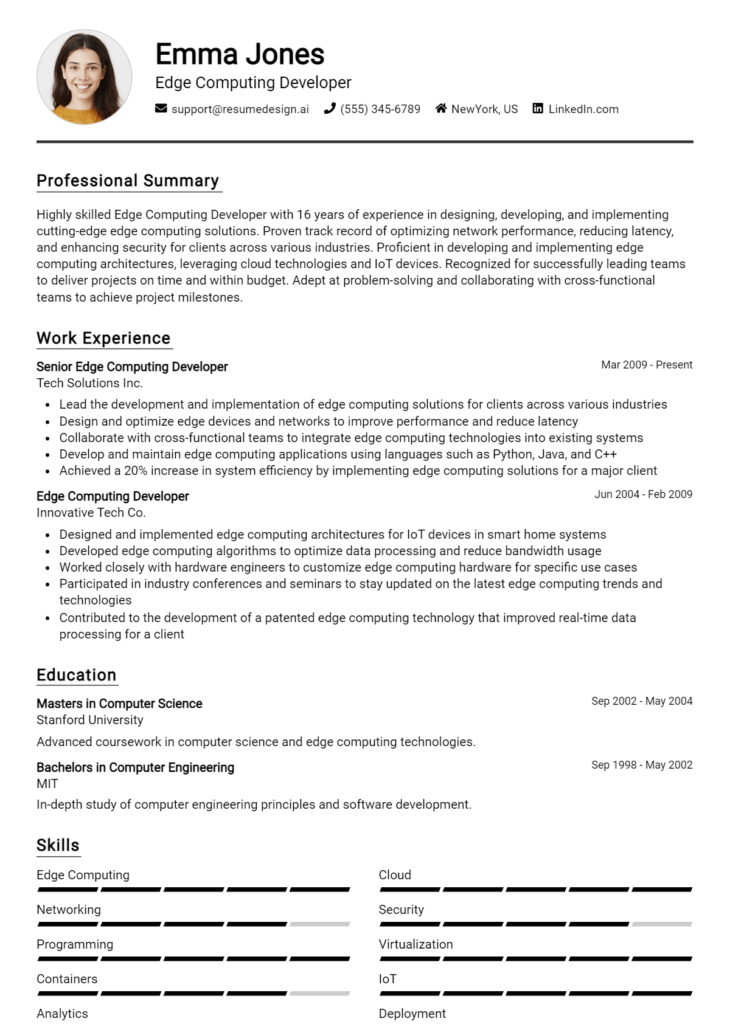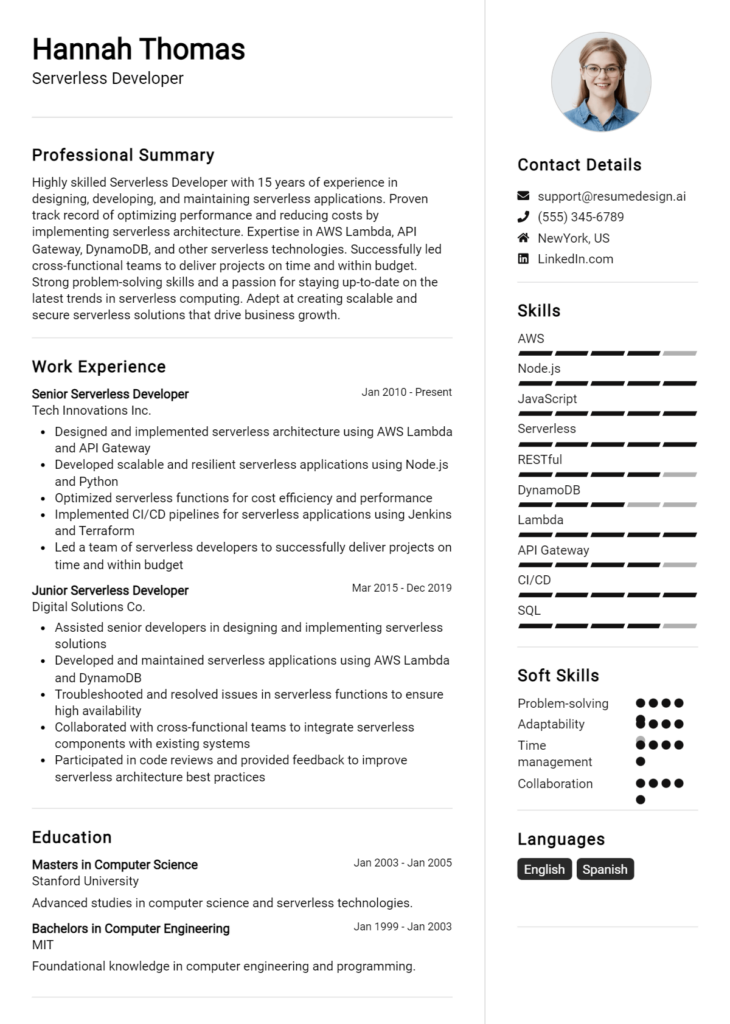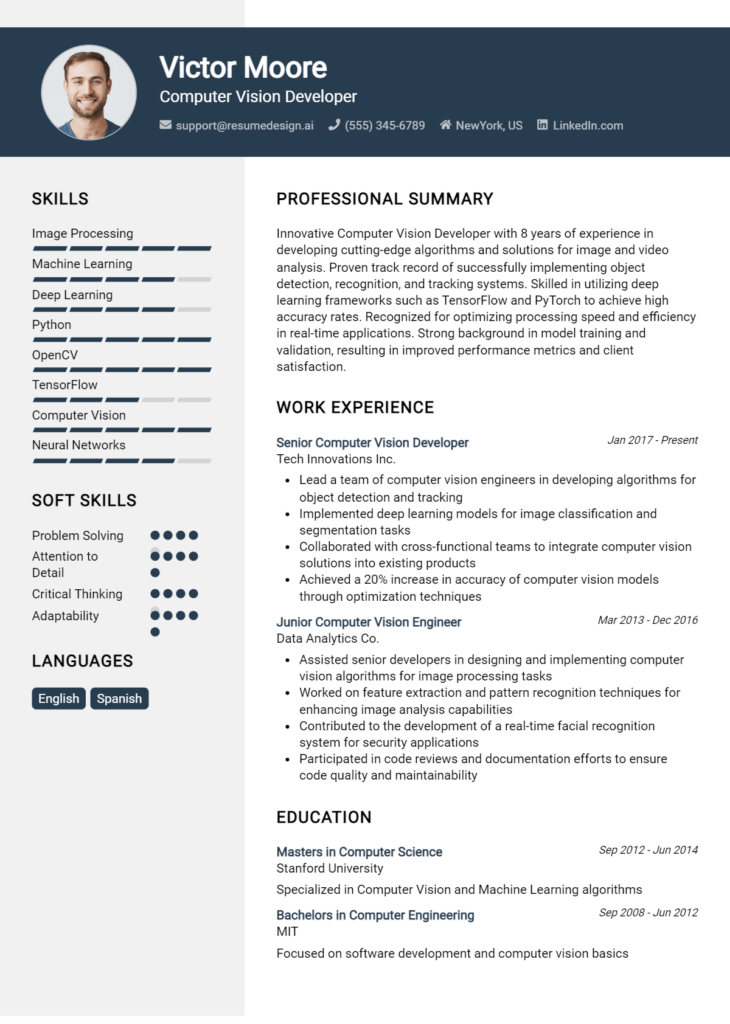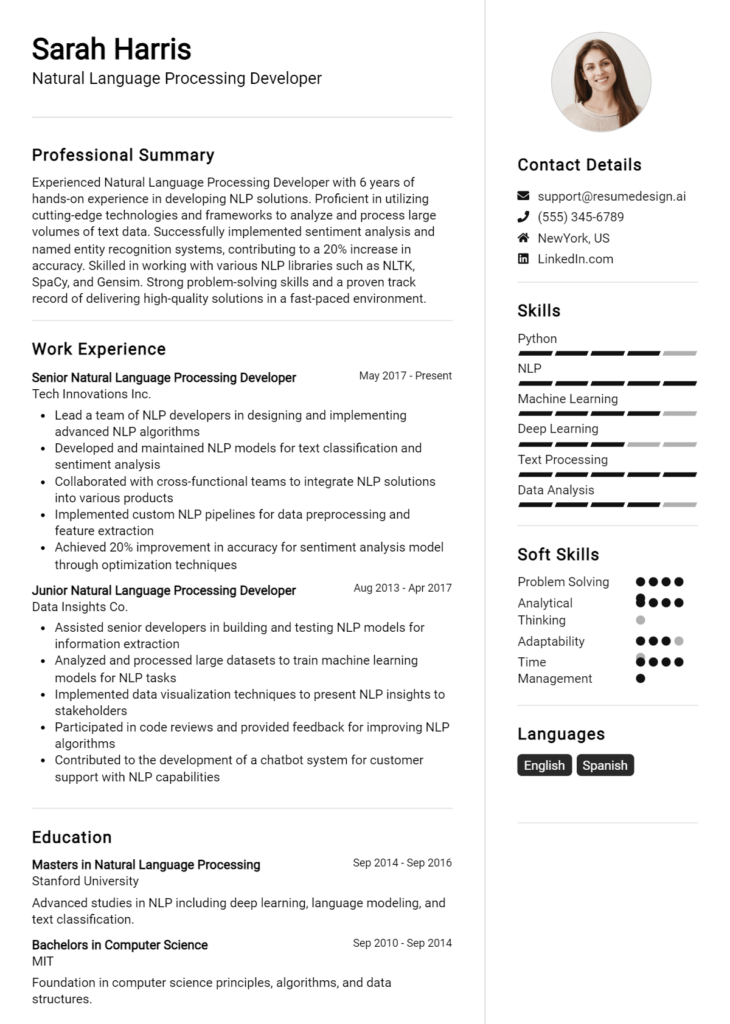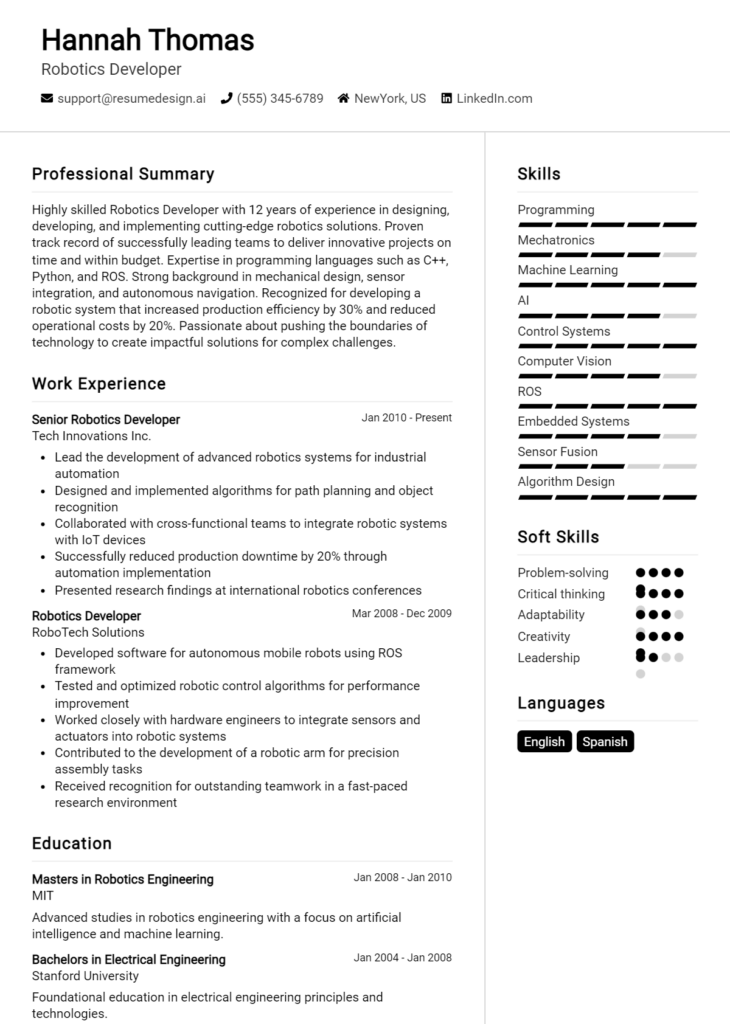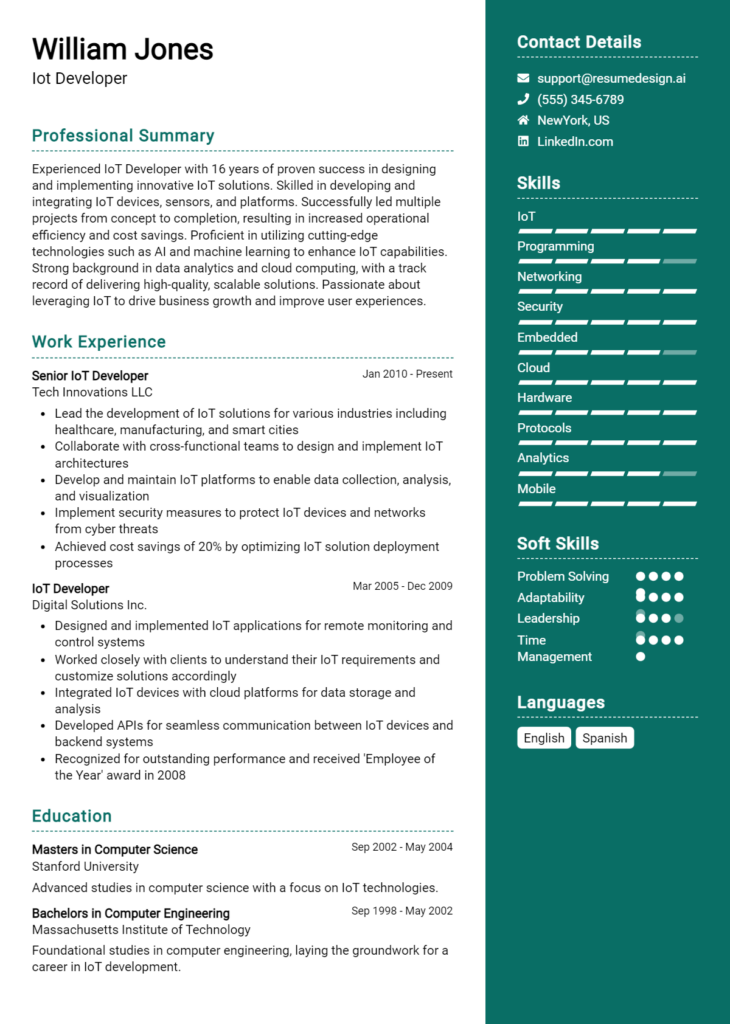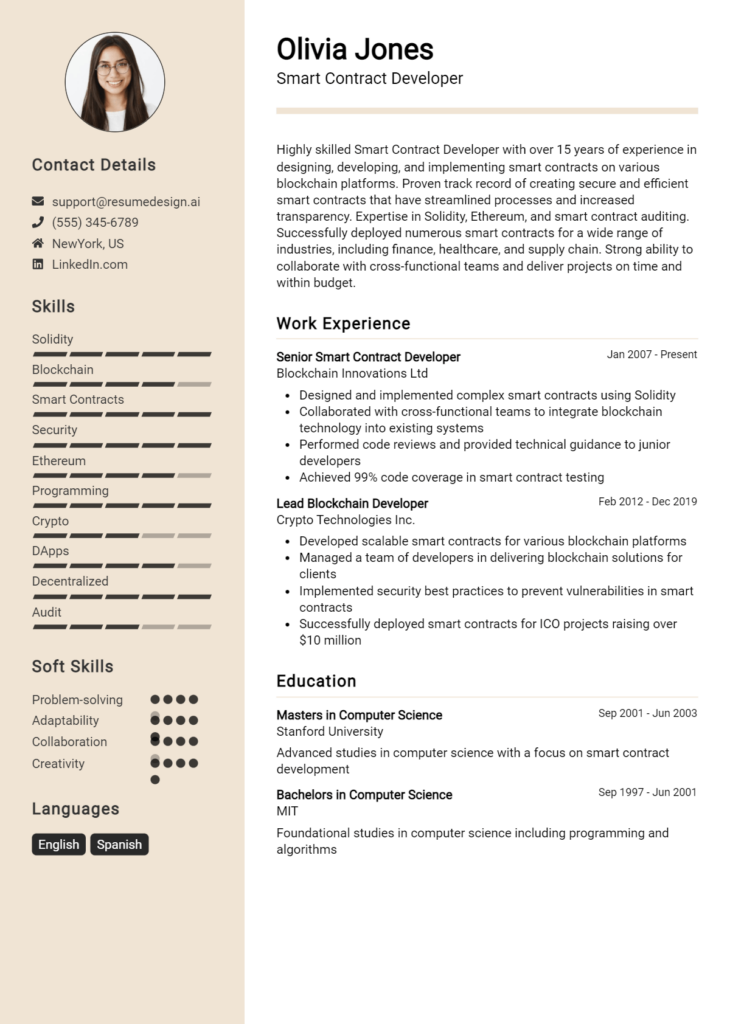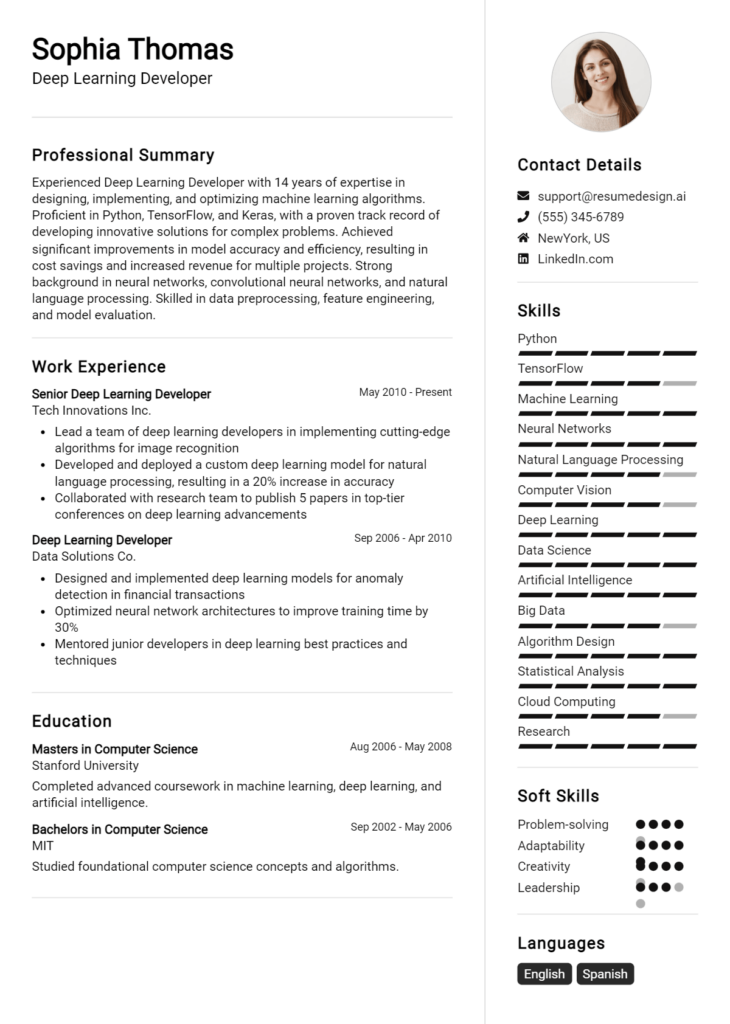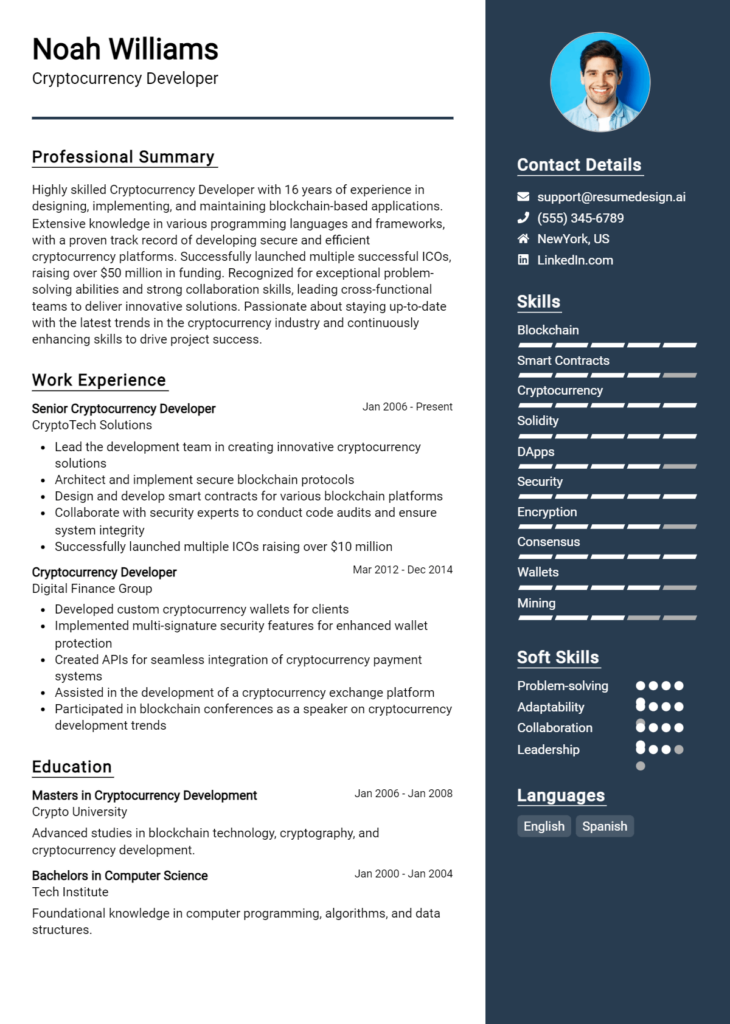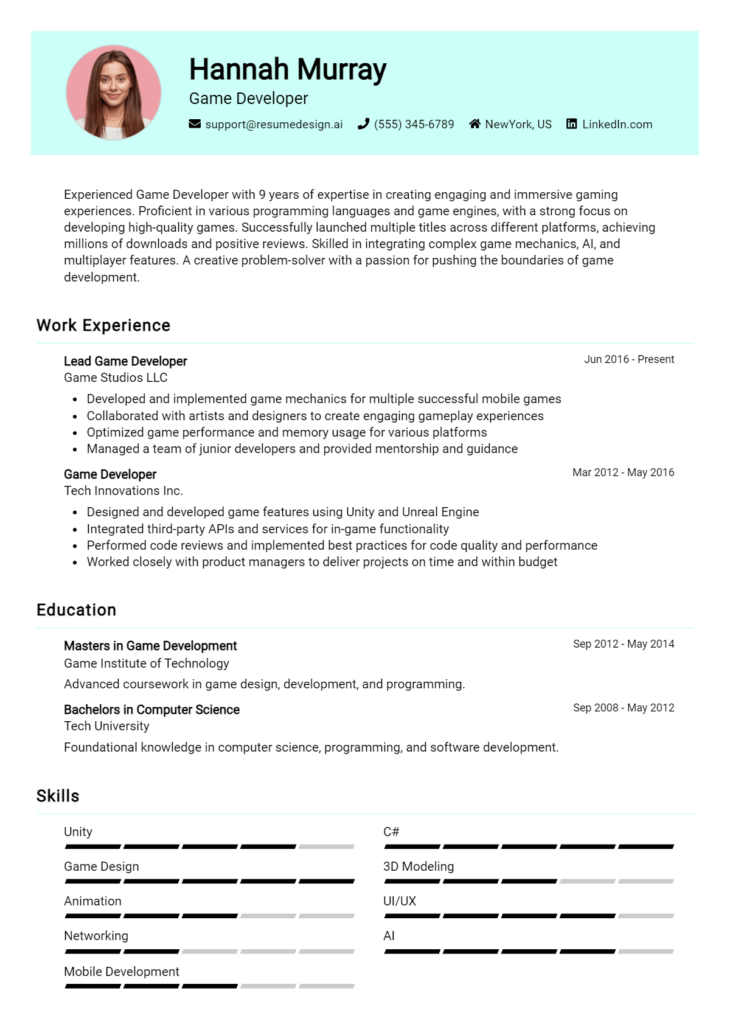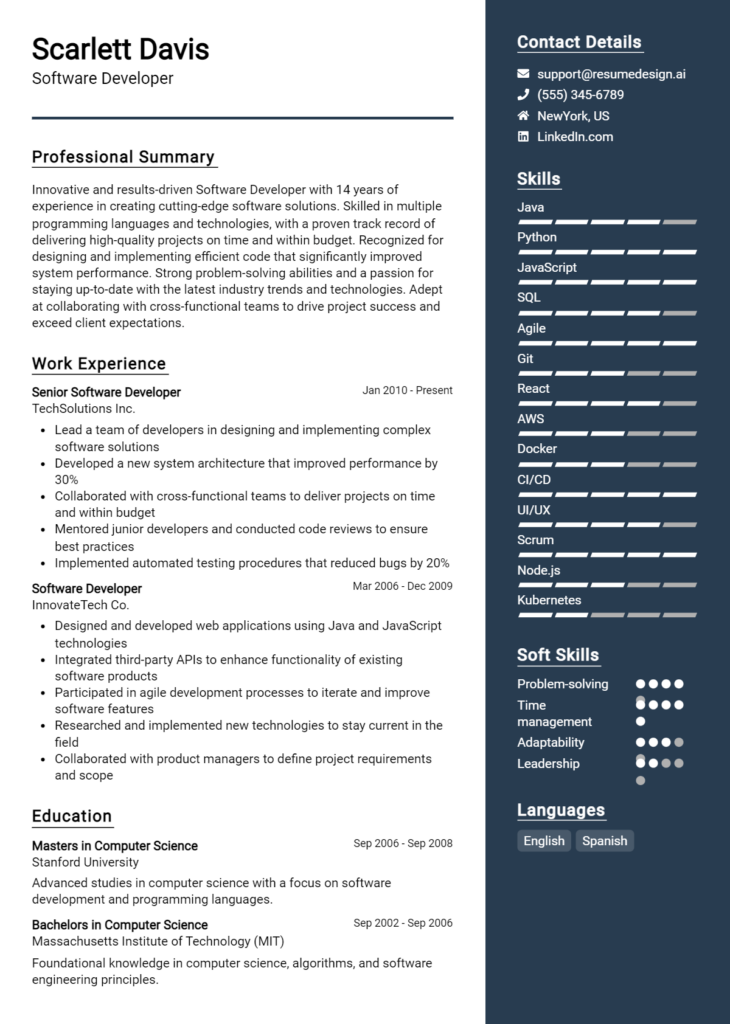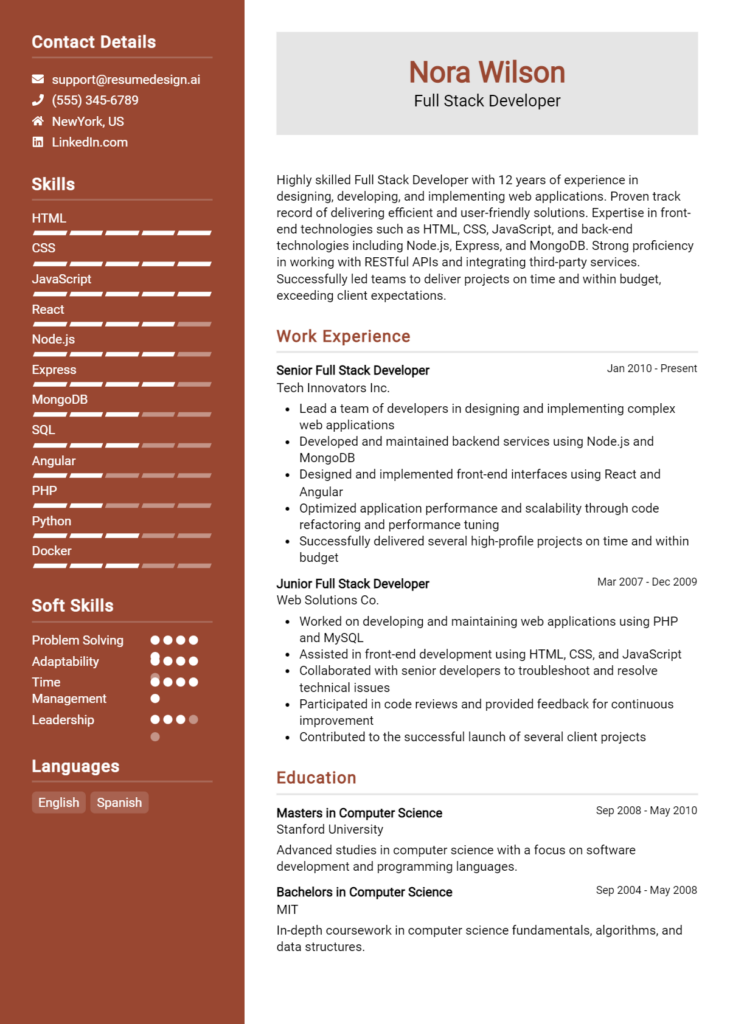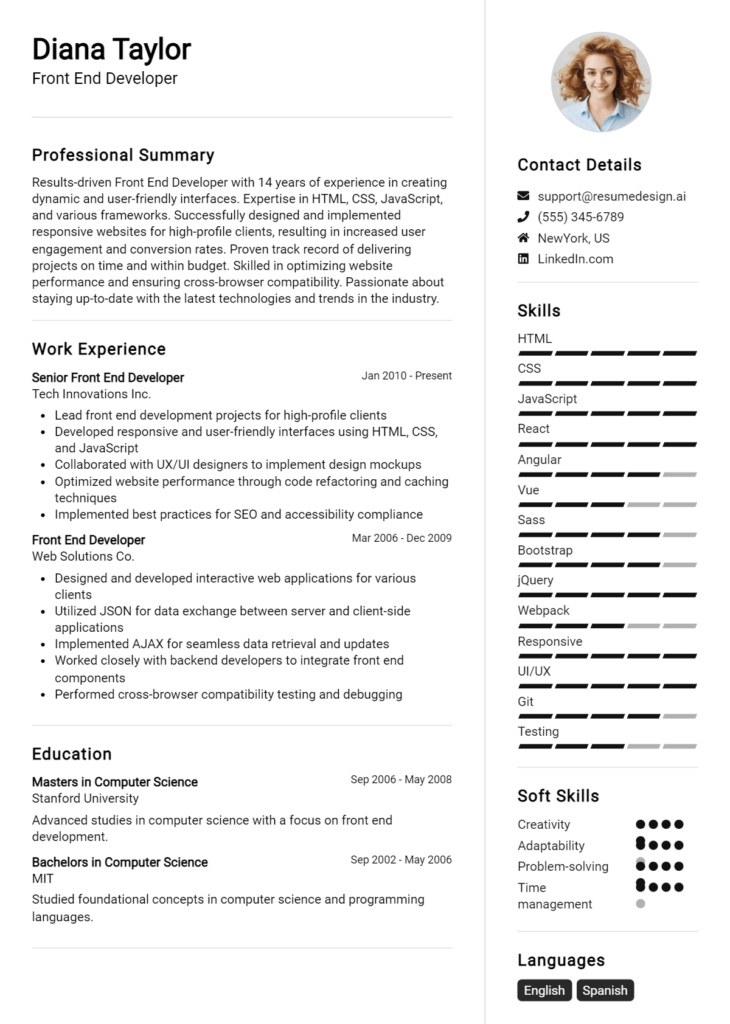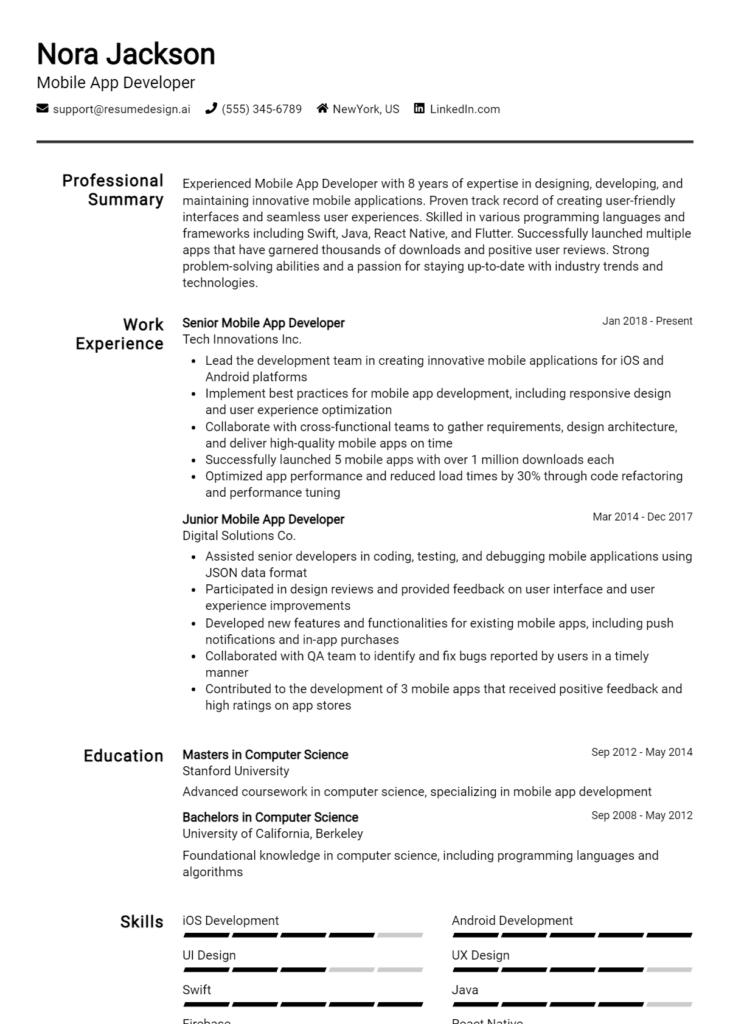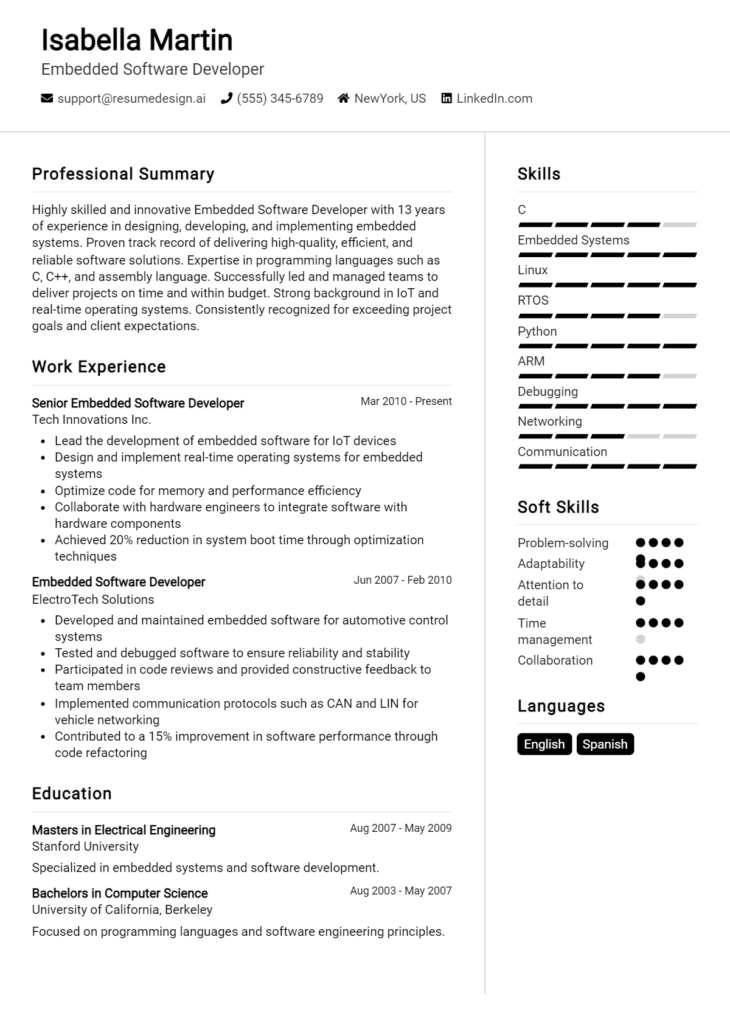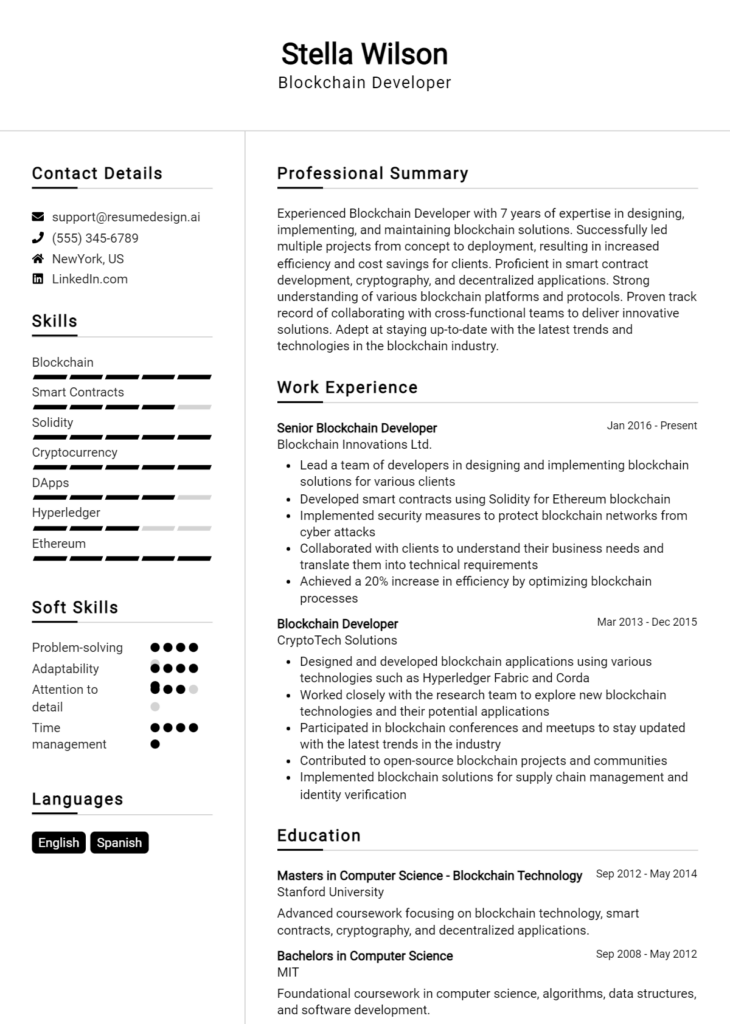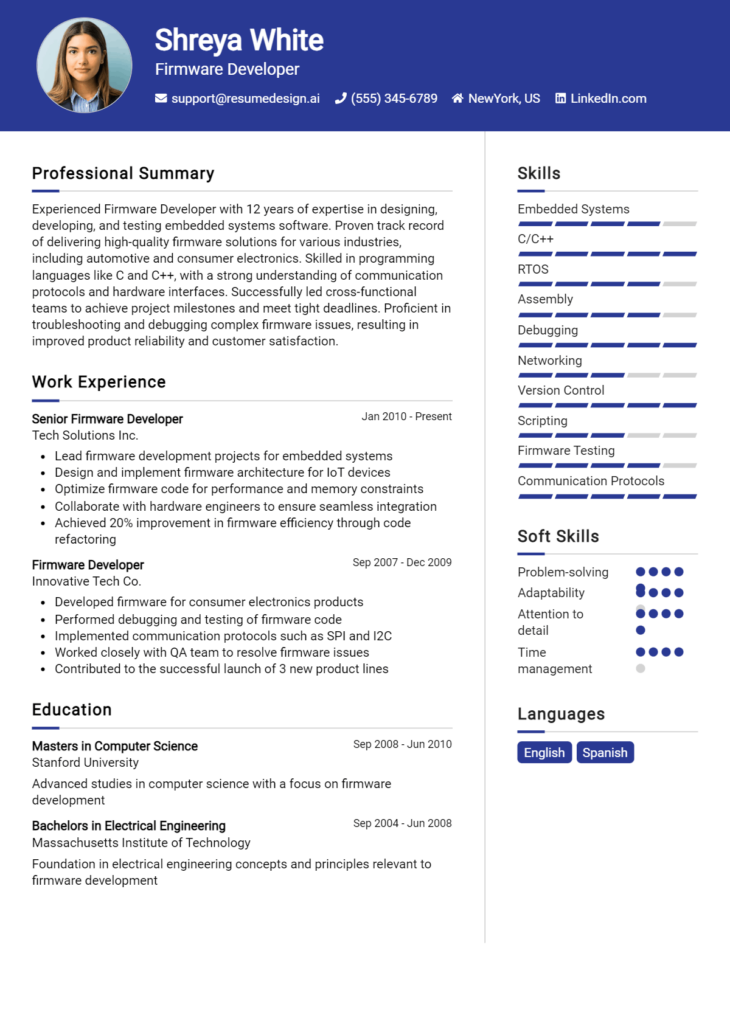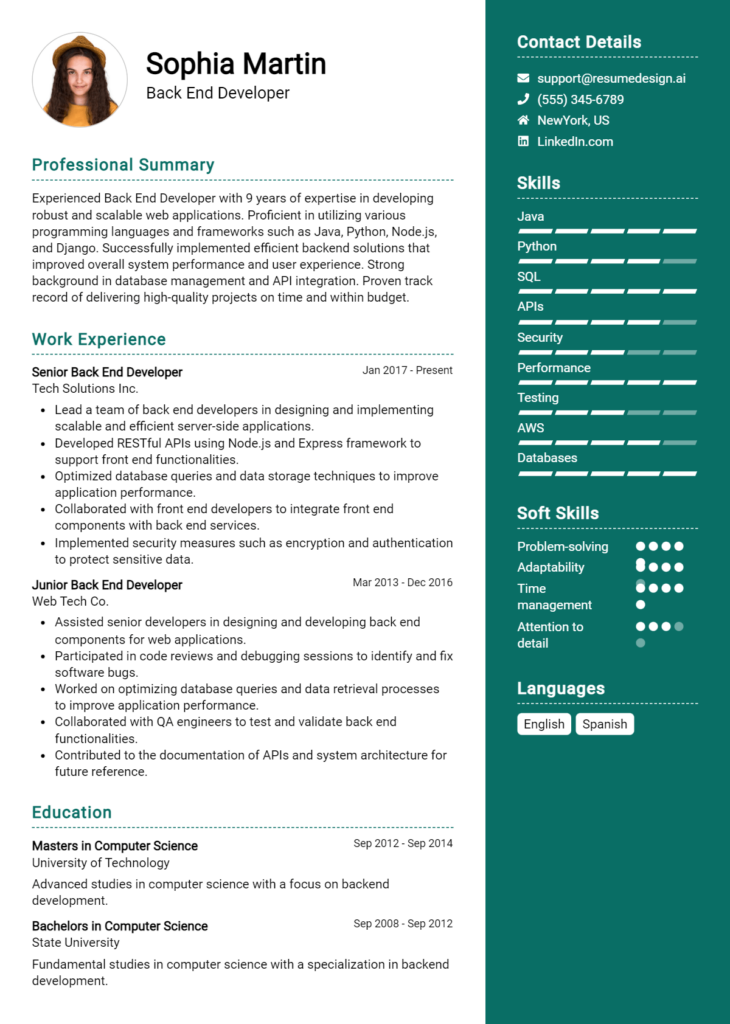Microservices Developer Core Responsibilities
A Microservices Developer plays a crucial role in designing, developing, and maintaining scalable applications that align with business objectives. This professional collaborates across departments, ensuring seamless integration and communication between services. Essential skills include proficiency in programming languages, cloud technologies, and container orchestration, alongside strong problem-solving and analytical abilities. These competencies are vital for optimizing system performance and enhancing user experience. A well-structured resume effectively highlights these qualifications, showcasing the candidate’s potential to contribute to organizational success.
Common Responsibilities Listed on Microservices Developer Resume
- Design and implement microservices architecture for scalable applications.
- Develop and maintain RESTful APIs for service interaction.
- Collaborate with cross-functional teams to define and refine project requirements.
- Utilize containerization tools like Docker and orchestration platforms like Kubernetes.
- Monitor and troubleshoot microservices performance and reliability.
- Conduct code reviews to ensure quality and adherence to best practices.
- Implement CI/CD pipelines for automated deployment processes.
- Write unit and integration tests to validate functionality.
- Optimize database interactions for improved data handling.
- Stay updated with industry trends and emerging technologies.
- Document microservices architecture and development processes.
- Participate in Agile methodologies to enhance project delivery.
High-Level Resume Tips for Microservices Developer Professionals
In today's competitive job market, a well-crafted resume is crucial for Microservices Developer professionals aiming to make a strong first impression on potential employers. Your resume serves as a snapshot of your skills, experiences, and achievements, oftentimes determining whether you'll land an interview or be passed over for another candidate. This document not only needs to showcase your technical expertise in microservices architecture and development but also demonstrate your ability to deliver impactful results. In this guide, we'll provide practical and actionable resume tips specifically tailored for Microservices Developer professionals to help you stand out from the crowd.
Top Resume Tips for Microservices Developer Professionals
- Tailor your resume to the job description by incorporating relevant keywords and phrases that match the requirements outlined by the employer.
- Highlight your experience with microservices frameworks and tools such as Spring Boot, Docker, Kubernetes, and API gateways.
- Quantify your achievements by using metrics, such as improved system performance, reduced latency, or increased deployment frequency, to illustrate your impact.
- Include specific projects that demonstrate your ability to design, develop, and maintain microservices, detailing your role and contributions.
- Showcase your knowledge of cloud platforms, such as AWS, Azure, or Google Cloud, and how you've utilized them in microservices deployments.
- Demonstrate proficiency in programming languages relevant to microservices development, like Java, Python, or Node.js, emphasizing your coding skills.
- Highlight any experience with DevOps practices, CI/CD pipelines, and automation tools that enhance the microservices development lifecycle.
- Include relevant certifications or training in microservices, cloud computing, or agile methodologies to bolster your qualifications.
- Keep the format clean and professional, using clear headings, bullet points, and a consistent style to enhance readability.
- Proofread thoroughly to eliminate typos and grammatical errors, as attention to detail is critical in technical roles.
By implementing these tips, you can significantly increase your chances of landing a job in the Microservices Developer field. A polished and targeted resume will not only highlight your unique qualifications but also demonstrate your understanding of the industry's demands, making you a more attractive candidate to potential employers.
Why Resume Headlines & Titles are Important for Microservices Developer
In the competitive landscape of tech recruitment, a Microservices Developer's resume must stand out from the crowd, and one of the most effective ways to achieve this is through a compelling resume headline or title. A strong headline captures the attention of hiring managers, providing an immediate snapshot of a candidate’s key qualifications and expertise. By distilling essential information into a concise, relevant phrase, the headline sets the tone for the rest of the resume and helps hiring managers quickly assess if the candidate is a good fit for the role. Therefore, crafting an impactful resume headline is crucial for making a lasting first impression in the hiring process.
Best Practices for Crafting Resume Headlines for Microservices Developer
- Keep it concise: Aim for one impactful sentence that summarizes your expertise.
- Be role-specific: Tailor the headline to align with the Microservices Developer position you are applying for.
- Highlight key skills: Include relevant technical skills or technologies that showcase your qualifications.
- Showcase experience level: Indicate your experience level (e.g., junior, senior) to set expectations.
- Use action words: Start with strong action verbs to convey confidence and proactivity.
- Reflect achievements: Consider including a notable accomplishment that distinguishes you from other candidates.
- Maintain professionalism: Ensure the language is professional and free from jargon that may confuse the reader.
- Avoid clichés: Steer clear of overused phrases that lack originality and fail to convey your unique value.
Example Resume Headlines for Microservices Developer
Strong Resume Headlines
"Innovative Microservices Developer Specializing in Scalable Cloud Solutions"
“Experienced Java Microservices Developer with 5+ Years in Agile Environments”
“Proficient Microservices Architect Focused on High-Performance Applications”
“Results-Driven Microservices Developer Committed to Delivering Robust API Solutions”
Weak Resume Headlines
“Developer Looking for Opportunities”
“Skilled in Many Technologies”
The strong headlines are effective because they are specific, convey a clear message about the candidate's capabilities, and highlight relevant experience or skills in a way that resonates with hiring managers. In contrast, the weak headlines fail to impress due to their vagueness and lack of focus, making it difficult for employers to understand what the candidate truly offers. By avoiding generic phrases and instead opting for targeted, impactful language, candidates can significantly enhance their chances of capturing the attention of potential employers.
Writing an Exceptional Microservices Developer Resume Summary
A well-crafted resume summary is crucial for a Microservices Developer, as it serves as a powerful first impression that can quickly capture the attention of hiring managers. This brief overview highlights the candidate's key skills, relevant experience, and significant accomplishments in microservices architecture and development. A strong summary is concise and impactful, tailored to the specific job description, ensuring that it resonates with the needs of the employer. By succinctly conveying the candidate's qualifications, a resume summary can set the tone for the rest of the application and increase the likelihood of securing an interview.
Best Practices for Writing a Microservices Developer Resume Summary
- Quantify achievements where possible, using metrics to demonstrate impact.
- Focus on relevant technical skills such as API design, containerization, and cloud services.
- Tailor the summary to align closely with the job description and requirements.
- Keep it concise, ideally between 3-5 sentences.
- Use strong action verbs to convey experience and accomplishments.
- Incorporate industry-specific terminology and tools (e.g., Docker, Kubernetes, Java, etc.).
- Highlight collaborative skills, as microservices often require cross-team communication.
- Showcase adaptability, emphasizing experience with evolving technologies and methodologies.
Example Microservices Developer Resume Summaries
Strong Resume Summaries
Detail-oriented Microservices Developer with over 5 years of experience in designing and implementing scalable microservices solutions. Successfully reduced application response time by 30% through innovative API management and optimization strategies. Proficient in Java, Spring Boot, and Docker, with a strong background in cloud-native architecture.
Results-driven Microservices Developer with a proven track record in deploying over 15 microservices projects in AWS environments. Enhanced system reliability by 25% through effective monitoring and automated CI/CD pipelines. Skilled in utilizing Kubernetes for orchestration and container management in multi-cloud settings.
Experienced Microservices Developer specializing in building resilient systems using RESTful APIs and microservices architecture. Collaborated with cross-functional teams to deliver a high-profile project that increased user engagement by 40%. Expertise in Agile methodologies and DevOps practices.
Weak Resume Summaries
Microservices Developer with experience in software development. Good at working with teams and has some knowledge of microservices.
Skilled developer looking for a new opportunity. Experienced in various programming languages and development processes.
The strong resume summaries stand out because they are specific, quantifiable, and directly relevant to the role of a Microservices Developer. They highlight measurable achievements and include important technical skills that align with industry standards. On the other hand, the weak summaries are vague, lacking detail and quantifiable outcomes, making them less impactful and relevant to potential employers.
Work Experience Section for Microservices Developer Resume
The work experience section of a Microservices Developer resume is critical, as it serves as a platform for candidates to demonstrate their technical skills, leadership capabilities, and commitment to delivering high-quality software products. This section not only highlights the applicant's proficiency in microservices architecture, cloud technologies, and programming languages but also illustrates their ability to manage teams effectively and drive projects to successful completion. Furthermore, quantifying achievements—such as reduced load times, improved system performance, or successful team collaborations—while aligning experiences with industry standards is essential for making a strong impression on potential employers.
Best Practices for Microservices Developer Work Experience
- Focus on relevant microservices technologies and frameworks, such as Docker, Kubernetes, and Spring Boot.
- Quantify achievements with specific metrics (e.g., improved API response times by 30%).
- Highlight leadership roles and team collaboration experiences in previous projects.
- Detail your contributions to system architecture and design decisions.
- Showcase your ability to work in Agile and DevOps environments.
- Include any experience with CI/CD pipelines and automated testing.
- Tailor your experience to match the requirements of the job description.
- Use action verbs to convey impact and responsibility effectively.
Example Work Experiences for Microservices Developer
Strong Experiences
- Led a team of 5 developers in migrating a monolithic application to a microservices architecture, resulting in a 40% decrease in deployment time.
- Designed and implemented a scalable API gateway that improved API response times by 50% and reduced server load by 25%.
- Collaborated with cross-functional teams to integrate CI/CD pipelines, increasing deployment frequency by 70% while maintaining a 99.9% uptime.
- Utilized containerization with Docker to streamline development and testing environments, reducing setup time by 60%.
Weak Experiences
- Worked on various software projects, contributing to the development of microservices.
- Assisted in team meetings and discussions regarding project implementations.
- Helped improve software applications in different capacities.
- Participated in code reviews and wrote some unit tests.
The examples of strong experiences are considered effective because they provide specific details about the applicant's contributions and measurable outcomes that directly relate to the role of a Microservices Developer. They emphasize leadership, technical skills, and collaborative efforts, showcasing the candidate's ability to drive significant improvements. In contrast, the weak experiences lack specificity and quantifiable results, making them less impactful and failing to convey the candidate's true capabilities and accomplishments in the field.
Education and Certifications Section for Microservices Developer Resume
The education and certifications section of a Microservices Developer resume is crucial for presenting the candidate's academic foundation and their commitment to professional development. This section not only showcases relevant degrees but also emphasizes industry-recognized certifications and specialized training that align with microservices architecture and development practices. By providing relevant coursework and continuous learning efforts, candidates can significantly enhance their credibility and demonstrate their alignment with the evolving demands of the industry, ultimately making them more appealing to potential employers.
Best Practices for Microservices Developer Education and Certifications
- Focus on relevant degrees, such as Computer Science or Software Engineering, that directly relate to microservices development.
- Include industry-recognized certifications, such as AWS Certified Solutions Architect or Certified Kubernetes Administrator, to demonstrate proficiency in cloud services and container orchestration.
- Highlight any specialized training or courses related to microservices architecture, DevOps practices, or specific programming languages like Java or Python.
- Provide details of relevant coursework that showcases knowledge of distributed systems, API design, and software development methodologies.
- Emphasize ongoing education efforts, such as online courses or workshops, to illustrate a commitment to keeping skills current.
- Use clear formatting to make this section easily scannable by recruiters, ensuring important information stands out.
- List certifications in reverse chronological order, highlighting the most recent and relevant first.
- Avoid including certifications or degrees that are outdated or unrelated to the position sought.
Example Education and Certifications for Microservices Developer
Strong Examples
- Bachelor of Science in Computer Science, University of Technology, 2021
- AWS Certified Solutions Architect – Associate, AWS, 2023
- Microservices Architecture: Make a Real-World Application with Spring Boot, Coursera, 2022
- Docker and Kubernetes: The Complete Guide, Udemy, 2023
Weak Examples
- Associate Degree in General Studies, Community College, 2019
- Certified Ethical Hacker (CEH), EC-Council, 2017
- Basic HTML and CSS Course, Online Platform, 2020
- Microsoft Office Specialist Certification, Microsoft, 2021
The strong examples are considered effective because they directly relate to the skills and knowledge required for a Microservices Developer, showcasing relevant degrees, certifications, and coursework that reflect a robust understanding of microservices architecture and cloud technologies. In contrast, the weak examples lack relevance to the role, either by being outdated, unrelated to microservices development, or not demonstrating advanced technical skills necessary for the position.
Top Skills & Keywords for Microservices Developer Resume
In today's rapidly evolving technology landscape, a Microservices Developer plays a critical role in ensuring that applications are designed, built, and operated in a scalable and efficient manner. As organizations increasingly adopt microservices architecture for its flexibility and resilience, the importance of showcasing relevant skills on a Microservices Developer resume cannot be overstated. A well-crafted resume not only highlights technical proficiency but also emphasizes interpersonal abilities that facilitate collaboration and innovation within development teams. By strategically incorporating both hard and soft skills, candidates can effectively demonstrate their value and suitability for the role.
Top Hard & Soft Skills for Microservices Developer
Soft Skills
- Effective communication
- Team collaboration
- Problem-solving
- Adaptability
- Critical thinking
- Time management
- Attention to detail
- Empathy
- Conflict resolution
- Creativity
Hard Skills
- Proficiency in programming languages (Java, Python, Node.js)
- Experience with RESTful API design
- Knowledge of containerization (Docker, Kubernetes)
- Familiarity with CI/CD pipelines
- Understanding of microservices architecture
- Proficiency in cloud services (AWS, Azure, Google Cloud)
- Database management (SQL, NoSQL)
- Experience with monitoring and logging tools (Prometheus, ELK Stack)
- Familiarity with Agile methodologies
- Knowledge of security best practices in microservices
Incorporating these skills and showcasing relevant work experience can significantly enhance your resume, making you a more attractive candidate for prospective employers.
Stand Out with a Winning Microservices Developer Cover Letter
Dear [Hiring Manager's Name],
I am writing to express my interest in the Microservices Developer position at [Company Name], as advertised on [where you found the job posting]. With a strong background in software development and extensive experience in designing and implementing microservices architectures, I am excited about the opportunity to contribute to your team's success. My proficiency in languages such as Java and Python, along with my hands-on experience with Docker and Kubernetes, positions me well to deliver scalable and efficient solutions that meet your organization's needs.
In my previous role at [Previous Company Name], I successfully led a project to transition a monolithic application to a microservices-based architecture. This involved breaking down the existing system into smaller, manageable services, which improved the application's scalability and maintainability. By leveraging RESTful APIs and asynchronous communication patterns, I was able to enhance system performance and reduce response times by 30%. My collaborative approach allowed me to work closely with cross-functional teams, ensuring seamless integration and deployment of microservices in a CI/CD pipeline.
I am particularly drawn to the innovative projects at [Company Name] and the emphasis you place on using cutting-edge technologies to drive business solutions. I am eager to bring my expertise in cloud-native development and agile methodologies to your organization. I am confident that my problem-solving skills and attention to detail will enable me to contribute effectively to your team and help [Company Name] continue to lead in the industry.
Thank you for considering my application. I look forward to the opportunity to discuss how my background, skills, and enthusiasms align with the goals of [Company Name]. I am excited about the possibility of contributing to your team and am available for an interview at your earliest convenience.
Sincerely,
[Your Name]
[Your LinkedIn Profile]
[Your Contact Information]
Common Mistakes to Avoid in a Microservices Developer Resume
When crafting a resume for a Microservices Developer position, it’s crucial to avoid common pitfalls that can hinder your chances of landing an interview. A well-structured resume should highlight your relevant skills, experiences, and achievements in the microservices ecosystem. However, many candidates make mistakes that can detract from their qualifications. Here are some common mistakes to avoid:
Vague Job Descriptions: Failing to provide specific details about your previous roles can make it difficult for recruiters to understand your contributions and expertise.
Neglecting Relevant Technologies: Not mentioning key technologies and tools used in microservices development, such as Docker, Kubernetes, or specific programming languages, can lead to missed opportunities.
Ignoring Soft Skills: While technical skills are essential, neglecting to highlight soft skills such as teamwork, communication, and problem-solving can give an incomplete picture of your capabilities.
Overly Complex Language: Using jargon or overly technical language can alienate hiring managers who may not have a deep technical background. Aim for clarity and conciseness.
Lack of Metrics: Failing to quantify your achievements, such as the impact of your contributions on performance or efficiency, can make your resume less compelling.
Not Tailoring for the Role: Sending out a generic resume without tailoring it to the specific job description can demonstrate a lack of genuine interest in the position.
Skipping Education and Certifications: Omitting relevant educational background or certifications, such as those related to microservices or cloud architecture, can make you less competitive against other candidates.
Ignoring Formatting and Organization: A cluttered or poorly organized resume can make it difficult for hiring managers to quickly find the information they need, potentially leading to overlooked qualifications.
By steering clear of these common mistakes, you can create a more impactful resume that effectively showcases your skills as a Microservices Developer.
Conclusion
As we’ve explored in this article, the role of a Microservices Developer is pivotal in modern software architecture. With a focus on building scalable, resilient, and independently deployable services, these developers must possess a strong understanding of various technologies, cloud platforms, and best practices in microservices design.
Key skills that employers look for include proficiency in containerization and orchestration tools like Docker and Kubernetes, familiarity with API design, and knowledge of programming languages such as Java, Python, or Node.js. Additionally, a solid grasp of DevOps principles can set you apart in the competitive job market.
As you reflect on your qualifications and experiences, it’s crucial to ensure your resume effectively showcases your skills as a Microservices Developer. A well-structured resume can significantly improve your chances of landing an interview.
Don't hesitate to take action now! Review your Microservices Developer Resume and consider leveraging the resources available to you. Explore our resume templates for a polished look, utilize our resume builder for an easy crafting experience, check out resume examples to get inspired, and don’t forget to enhance your job application with a compelling cover letter template. Make your application stand out today!

